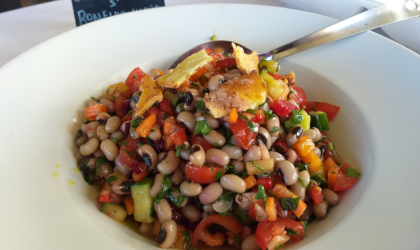- Details
- Written by Lisa Radinovsky
- Category: Mediterranean Diet Health Benefits
The 30th anniversary of the official publication of the Mediterranean Diet Pyramid was commemorated as part of World Olive Day on November 21, 2024. Honoring the pioneers and organizations that promoted this initiative three decades ago, this event brought leading public health experts to Madrid, Spain to share their insights about the Mediterranean diet.
- Details
- Written by Lisa Radinovsky
- Category: Mediterranean Diet Health Benefits
With the Mediterranean diet ranked the “Best Diet Overall” by U.S. News & World Report for the 7th year in a row in 2024, it is a model for healthy eating. In fact, it is even more. It goes beyond food to include various aspects of the traditional Mediterranean way of life. Resembling other traditional, healthy lifestyles, it is easy for many to embrace.
- Details
- Written by Lisa Radinovsky
- Category: Mediterranean Diet Health Benefits
Ranked the “Best Diet Overall” by U.S. News & World Report for the 7th year in a row in 2024, the Mediterranean diet’s health benefits are well known. But what exactly is this diet, and can everyone follow it? Harvard Professor Frank Hu has suggested that fusing it with a traditional Asian diet may make the Mediterranean diet more beneficial to more people.
- Details
- Written by Lisa Radinovsky
- Category: Mediterranean Diet Health Benefits
The Mediterranean diet is a healthy, tasty diet and lifestyle associated with communities near certain parts of the Mediterranean Sea, especially the Greek island of Crete, based on the way the locals typically ate before the 1960s. The American professor Ancel Keys led the first major study of the health benefits of this diet in the 1950s.
- Details
- Written by Lisa Radinovsky
- Category: Mediterranean Diet Health Benefits
Headlines worldwide praise the health benefits of the Mediterranean diet. At a conference on the Greek island of Crete, international experts emphasized what many have agreed on for years: the foundation of this diet was discovered in the culinary tradition of Crete decades ago. Scientists argue that this tradition still offers a wealth of benefits.
- Details
- Written by Lisa Radinovsky
- Category: Mediterranean Diet Health Benefits
A world-famous expert on the Mediterranean diet, Dr. Antonia Trichopoulou, spoke to a Greek audience about “Extra Virgin Olive Oil: The Secrets We All Know” at the Food Expo in Athens this spring. “We all know olive oil,” she said; “it’s in our DNA. Olive oil is not only health … it is culture, it is tradition, it is the economy, it is the environment.”
- Details
- Written by Lisa Radinovsky
- Category: Mediterranean Diet Health Benefits
Many scientific studies have provided evidence of olive oil’s health benefits. Registered dietitian and nutritionist Elena Paravantes is a strong advocate of this healthy oil and the Greek Mediterranean diet where it plays a major role. She believes this oil and diet contributed to her progenitors’ longevity. For example, her grandfather lived 104 years.
Mediterranean Diet Health Benefits Web Links
-
Defining the Traditional Mediterranean Lifestyle: Joint International Consensus Statement
A definition of "the primary lifestyle factors ingrained in Mediterranean inhabitants across generations" that was compiled by "a multidisciplinary panel comprising international experts and leaders in lifestyle medicine" that was convened by the Mediterranean Lifestyle Medicine Institute Board of Directors.
-
MedDiet Adherence Associated With Lower Mortality Risk for Cancer Survivors
"Researchers followed 800 cancer survivors for more than a decade, observing that Mediterranean diet adherence could be associated with a lower all-cause mortality."
-
Med Diet More Effective in Obesity Prevention than Other Diets, Study Finds
"The literature review found that the conviviality of the Mediterranean diet and its focus on consuming healthy fats help make it more effective than low-fat diets."
-
Mediterranean Diet
Judging the Mediterranean diet the Best Diet Overall for the 6th year in 2023, U.S. News & World Report also provides a good discussion of the reasons for that decision, the diet's benefits, and how to follow the diet.
-
Health Study Reveals How Mediterranean Diet Might Counteract Covid-19
"New research demonstrated that flavonoids and hydroxytyrosol counteract some of the most deadly impacts of Covid 19, including cytokine storms and lung inflammation."
-
Researchers Review Benefits of Mediterranean Diet to Reduce Obesity
"After an extensive review of the scientific literature, researchers found that following the Mediterranean diet yields many benefits for obese people and those at risk of obesity" as well as being "the healthiest dietary pattern available to prevent several non-communicable diseases, including cardiovascular disease and type 2 diabetes.”
-
Mediterranean Diet #1 in Best Diets Overall 2022
For the fifth year in a row, the olive-oil-rich Mediterranean diet was ranked the Best Diet Overall by U.S. News & World Report. Find out why.
-
Following the MedDiet Improves Depression Symptoms in Young Men
"Researchers said the results demonstrate the role of a healthy diet in the treatment of depression in young adults."
-
Mediterranean Diet Might Mitigate ADHD in Children, Study Suggests
Several studies suggest that the Mediterranean diet may help fight ADHD.
-
Researchers Link Adherence to Med Diet with Improved Outlook for Clinically Depressed
"Following the Mediterranean diet was linked with the normal development of an important part of the nervous system in depressed patients. "
-
Science Might Have Identified the Optimal Human Diet
"Based on the best nutrition research to date, [cardiologist Dr. James O'Keefe] says that a diet loaded with plant-based foods, fish, and extra-virgin olive oil — coupled with time-restricted eating — seems like the plan with the most upside." The article identifies this as "essentially a modified Mediterranean plan."
-
Mediterranean Diet Most Effective for Reducing Risk of Heart Disease, Study Finds
As Julie Al-Zoubi wrote, "The research team discovered that the MedDiet was the only diet to deliver any long-term benefits and it was particularly effective in the reduction of Low-Density Lipoprotein (also known as bad cholesterol) which increases the risk of cardiovascular disease."
-
Patients with IBD may see health improvements with Mediterranean diet
Another reason to follow a traditional Mediterranean diet: it may help people with inflammatory bowel disease.
-
Cooking vegetables in olive oil boosts anti-inflammatory properties
Scientific research shows that the act of cooking a traditional Mediterranean tomato sauce with onion, garlic, and extra virgin olive oil creates an especially healthy mixture rich in phenolic compounds that are easily absorbed by the body.
-
Mediterranean Diet Repeats as Best Overall of 2020
The Mediterranean diet was again ranked the Best Diet Overall, as well as the Best Diet for Healthy Eating, Best Diet for Diabetes, Best Plant-Based, the Easiest Diet to Follow, and the 2nd best Heart-Healthy diet, in the U.S. News & World Report annual rankings.
-
Mediterranean diet named the best for 2019
US News and World Report has judged the Mediterranean diet the best overall diet, as well as the best diet for diabetes; it also tied for first as the best heart-healthy diet. The benefits of the Med diet and several other diets are discussed here.
-
Following a Mediterranean Diet Can Help Beat Depression
"A new study published by a group of Australian researchers suggests that eating a diet rich in fruits, vegetables, nuts, seeds and fish, such as the Mediterranean diet, can help reduce the symptoms of depression."
-
Mediterranean Diet Boosts Athletes’ Performance Within Days [update]
"Researchers believe characteristics of the Mediterranean diet, such as anti-inflammatory and antioxidant properties, might improve endurance."
-
Mediterranean Diet Plus Regular Exercise Maintains Weight Loss
As Mary West writes for Olive Oil Times, "A new study shows the formula for long-term weight loss and heart health is to eat the nutritious Mediterranean diet and engage in regular workouts."
-
New Study Delves Into Mechanisms Behind MedDiet’s Health Benefits
As Mary West wrote for Olive Oil Times, "Researchers found that following the Mediterranean diet may reduce the risk of developing cardiovascular disease by 25 percent. They also got some clues as to why this may be the case."
-
Mediterranean diet linked to sex in later life
"Eating a Mediterranean diet could give men the best chance of maintaining a sex life well into old age, research suggests - and olive oil is the key."
-
Mediterranean diet significantly reduces the risk of mortality in elderly people, study finds
"Although the knowledge that the Mediterranean diet can reduce the risk of mortality is not new, this is the first time it has been shown to have a positive effect solely on the elderly."
-
Mediterranean diet: The secret to a long life... drink a shot of olive oil every day But don't try and scrimp on the cheap stuff
“The ‘PREDIMED’ study, published in the New England Journal of Medicine in 2013 conclusively showed that the Mediterranean diet group had a third less heart disease, diabetes and stroke than the low-fat group. They also lost a little weight and had less memory loss,” according to this “randomised control trial that looked at a large group of people over a long period of time.” Extra virgin olive oil seemed to be the most important factor.
-
Conference on Olive Oil and Prevention of Chronic Disease
At a conference at the UC Davis Olive Center, nutrition and preventive medicine experts presented the latest scientific findings on the health benefits of olive oil and the Mediterranean diet.
-
Mediterranean Diet #1 in Best Diets Overall
The U.S. News & World Report's overview of the Mediterranean diet, which they've ranked as one of the best diets this year (#1 in several categories).
-
The Mediterranean Diet Revisited
A very good overview of the Greek Mediterranean diet and its health benefits, published in 2010.
-
Mediterranean diet may blunt air pollution's ill health effects
Eating a Mediterranean diet may protect people from some of the harm of long-term exposure to air pollution, and reduce their risk of dying from heart attacks, stroke and other causes of death, according to new research.
-
Good taste and good for you: the Mediterranean diet
Argues that “the Mediterranean diet is a fabulous way to eat, not just because it’s nutritious and health-promoting, but because it simply tastes good,” explains the health benefits of various elements of the diet, and includes 2 recipes.
-
The Mediterranean Diet: Is It the Food or the Lifestyle?
It seems to be both.
-
Mediterranean diet pyramid: a cultural model for healthy eating.
The article abstract available here provides a good, concise overview of a 1995 article introducing the Mediterranean food pyramid.
-
Study dispels belief healthy diets are costly
“[T]he study found that a plant-based, extra-virgin olive oil diet is cheaper than the most economical recommendations for healthy eating coming from the United States Department of Agriculture (USDA).”
-
Mediterranean diet with extra olive oil 'slashes the risk of breast cancer by two-thirds'
A Spanish study comparing two groups of women 60 to 80 years old showed a far lower risk of breast cancer in those following a Mediterranean diet with added extra virgin olive oil, compared with those following a low-fat diet.
-
Med Diet with Extra Virgin Olive Oil Reduces Incidence of Invasive Breast Cancer
Randomized trial shows that consuming a MedDiet supplemented with extra virgin olive oil reduces invasive breast cancer by 68 percent.
-
Cardiometabolic Benefits of Mediterranean Diet with Olive Oil in Type 2 Diabetics
Following a Mediterranean dietary pattern provides a wide range of sustained health benefits, reducing the risk and aiding in treatment of type 2 diabetes.
-
Mediterranean Diet with EVOO Reduces Cognitive Decline in Older Age
A Mediterranean diet supplemented with extra virgin olive oil is a promising dietary intervention to reduce age-related cognitive decline including Alzheimer's, dementia, and mild cognitive impairment.
-
Med Diet Linked with Better Cognitive Function and Other Study Abstracts
Oldways provides concise summaries of 13 scientific studies offering evidence that the Mediterranean diet can help brain health.
-
Low Carb Mediterranean Diet Results in Higher Rate of Remission in Type 2 Diabetes
A low-carb Mediterranean diet delays medication use and results in higher rate of remission in type 2 diabetes compared to low-fat diet.
-
High-fat Mediterranean diet does not cause weight gain, study finds
“Researchers found that people whose diets were rich in olive oil and nuts lost more weight than those on low-fat regime.”
-
Should you really eat fat to stay slim? The new food rules explained
The Telegraph’s May 2016 summary of the latest in British nutrition advice.
-
Mediterranean diet better for the heart than taking statins, major study suggests
Discusses a recent study suggesting the Mediterranean diet has "a 'powerful' effect, cutting deaths from all causes" in "people who have already suffered from cardiovascular disease" as well as in the general population, and compares the effect of statins.
-
Med Diet with Olive Oil is Good for Your Brain
"A new Australian study confirms that the Mediterranean Diet improves brain function, slows cognitive decline, and reduces the risk of Alzheimer's."
-
Mediterranean Diet Reduces Risk of Colon Cancer
"The Mediterranean diet (MedDiet) and consumption of extra virgin olive oil (EVOO) has been shown to be beneficial for numerous cancers including breast cancer, bladder cancer, brain cancer, prostate cancer, and now two recent studies report the MedDiet may play a role in reducing risk of colorectal cancer."
-
Med Diet Decreases Inflammation, Increases Mobility in Osteoarthritis Sufferers
"A Mediterranean diet decreases weight, inflammation and cartilage degradation in osteoarthritis sufferers."
-
Mediterranean diet may have lasting effects on brain health
"A new study shows that older people who followed a Mediterranean diet retained more brain volume over a three-year period than those who did not follow the diet as closely."
-
5 Foods That Fight Rheumatoid Arthritis
A recent review of scientific studies found that olive oil was one of the foods that can "help alleviate the symptoms of rheumatoid arthritis. The authors determined the Mediterranean diet (MedDiet) was one of the eating plans that are beneficial for this condition," since most of the helpful foods they pinpointed are part of the MedDiet.
-
Moderate Exercise, Mediterranean Diet Better at Reducing Fat Deposits
As Mary West writes, “A Mediterranean diet, rich in unsaturated fats and low in carbohydrates, was a more effective strategy than an iso-caloric low-fat diet to dramatically reverse morbid fat storage sites” in a recent clinical trial.
-
Mediterranean diet really does fight depression
In a University of South Australia study, "Researchers found that consuming a Mediterranean diet rich in vegetables, legumes, fruit, nuts, fish oil and extra virgin olive oil reduced depression and improved quality of life."
-
Mediterranean Diet May Improve IVF Success
"A new study suggests that women who ate a diet rich in fresh fruit and vegetables, fish, high-quality olive oil, whole grains and legumes and low in red meat increased their chances of getting pregnant and achieving a live birth by 65-68 percent."
-
Med Diet Tied to Higher Bone Mass, Muscle Density After Menopause
"A study found adherence to the Mediterranean diet helps protect women from some of the harmful health consequences of menopause."
-
There's even more evidence of a powerful connection between diet and depression — and one type of eating plan may help curb symptoms
That is the Mediterranean diet, which is also associated with many other health benefits that are mentioned in this unusually good, clear, in-depth article.
-
Mediterranean Diet Could Save U.S. Economy Billions
"A new study has shown the cost-effectiveness of the Mediterranean diet."
-
Reduced Risk of Cardiovascular Events with Med Diet and EVOO or Nuts
"A new study suggested that a nutritious diet with healthy fat is more beneficial to the heart than a low-fat diet."
-
Mediterranean Diet May Slow Progression of Psoriasis
Mary West quotes Céline Phan: “We cannot assume from this observational study that following the MedDiet will reduce the risk of psoriasis; however, it highlights an inverse association between the MedDiet and the severity of the disease."
-
Med Diet May Lower Stroke Risk in Women
"A new study in the U.K. suggests the Mediterranean diet may be particularly protective of stroke in women over 40, regardless of whether they take hormone replacement therapy or have experienced menopause."
-
Mediterranean Diet Linked to 33-Percent Lower Depression Risk
An anti-inflammatory Mediterranean diet is associated with a much lower risk of depression than an unhealthy, sugary diet.
-
Mediterranean Diet May Help Prevent Macular Degeneration
"A new study found eating a diet plentiful in fruit, vegetables and fatty fish, such as the Mediterranean diet, can help protect from an eye disease that erodes central vision."
-
Key Nutrients in Mediterranean Diet Linked to Healthy Brain Aging
"Illinois researchers discover nutrients from fatty fish, whole grains, nuts, seeds, fruits and vegetables work synergistically to enhance brain health."
-
Dietary Fiber Linked to Lower Risk of Heart Disease and Cancer
As Mary West writes for Olive Oil Times, "Consuming a minimum of 25 to 29 grams of fiber from Mediterranean diet plant foods is significantly tied to better health and longevity, including a lower ... risk of diabetes."
-
Mediterranean Diet Linked to Lower Risk of Bladder Cancer
"New research suggests an inverse relationship exists between following the Mediterranean diet and the incidence of bladder cancer."
-
Study Suggests Mediterranean Diet Benefits Pregnant Women
"The study showed that pregnant women following a Mediterranean diet benefited from less pregnancy-related weight gain and a lowered risk of developing gestational diabetes."
-
Vegetables' health benefits increase when cooked with extra virgin olive oil
"The main result of the study is that cooking vegetables with extra virgin olive oil favors the bioactive compounds, such as carotenoids and polyphenols that are present in vegetables we find in sofrito, to move to the olive oil, which enables the absorption and bioactivity of these compounds."
-
Mediterranean Diet and Mental Health
This article discusses many of the benefits of the Mediterranean diet and one of its key components, extra virgin olive oil, for our mental and physical health.
-
Following a Mediterranean Diet May Reverse Cognitive Decline in Elderly
"Some of the most common effects of aging on cognitive abilities may be curtailed by adhering to the Mediterranean diet, according to a new study published in Clinical Nutrition."
-
Does eating high-fat foods make you fat?
No. "People don’t get fat because they eat too much, consuming more calories than they expend, but because the carbohydrates in their diets—both the quantity of carbohydrates and their quality—establish a hormonal milieu that fosters the accumulation of excess fat."
-
Mortality benefits of Mediterranean diet know no boundaries
"People who adhere to a Mediterranean lifestyle — which includes a diet rich in fruits, vegetables, and whole grains; healthy eating habits like limiting added salts and sugars; and habits promoting adequate rest, physical activity, and socialization — have a lower risk of all-cause and cancer mortality, according to a new study."
-
Researchers Investigate Links Between MedDiet Adherence and Oral Health
"The Mediterranean diet's antimicrobial and anti-inflammatory effects and its role in maintaining beneficial microorganisms are linked with positive oral health outcomes."








